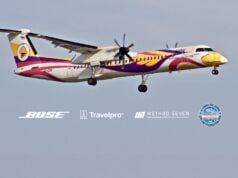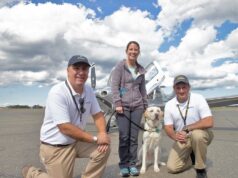
An independent pilot labor advocate, the NetJets Association of Shared Aircraft Pilots (NJASAP) represents the professional interests of the 3,100 plus crewmembers who fly in the service of NetJets Aviation, Inc., a Berkshire Hathaway subsidiary. NJASAP is privileged to represent a highly skilled and knowledgeable pilot force that is consistently recognized for outstanding skill, experience and commitment to their craft. The group consistently receives high owner satisfaction ratings, which the Union attributes to its members’ unfailing professionalism, consistency in the performance of their duties and compliance with company and federal regulations.
NetJets owners and customers pay a premium for the very best, and, each and every day, NJASAP members strive to deliver it.
THE PILOT SHORTAGE IS REAL
For more than a decade, NJASAP has watched the rapidly tightening supply of qualified pilots reshape flight deck staffing requirements. In response, carriers across the industry have sought an advantage, resulting in record growth in pilot compensation. NetJets remained competitive for pilot talent in this turbulent market by agreeing to adjust pilot compensation above contract rates in 2018 and 2020. Dramatic changes in the market since that time, however, now require the global leader in fractional air transportation to adjust pilot compensation to remain competitive for pilots.

The industry-wide pursuit of qualified pilots that led to these unprecedented pay improvements at regional carriers has now spilled over to mainline carriers: In many cases, their regional partners are offering entry-level pilot pay rates that exceed their own. Undeniably, the pilot labor crisis is forcing all carriers in the commercial airline industry to offer dramatically improved pilot compensation, work rules and benefits to recruit and to secure qualified personnel in this increasingly tight market.
Since October 2022, all five mainline carriers that have concluded negotiations with their pilot groups have produced contracts that feature large pay increases and other significant improvements.
NetJets, however, has opted not to compete for the best and brightest talent in the marketplace: Career earnings for a professional NetJets pilot are no longer competitive – far from it, in fact. Pilot compensation at NetJets not only trails that of the legacy carriers, but also low-cost carriers like JetBlue, ultra low-cost carriers like Spirit and regional airlines such as SkyWest. What was once a career destination for professional aviators is slowly transitioning into a stepping stone – a place to build time, not a career. Indeed, talented aviators will not stay at NetJets where they will make 60% of what their peers will earn at a low-cost carrier across a 30-year career.
American Airlines
41.5% in pay raises by 2027 + other improvements
United Airlines
Pilot pay would increase up to 40% across the four-year deal
Delta Airlines
34% increase in average pilot pay rates over four years plus significant improvements to scheduling, benefits and job protection language
Hawaiian Airlines
32% increase in average pilot pay rates over four years
Spirit Airlines
30% increase in pilot pay scales over three years + other benefits
Alaska Airlines
23% increase in pay scales in two years + scheduling improvements
JetBlue
21.5% increase in pilot pay rates in an 18-month contract extension
When pilots have their choice of carriers, why choose one that refuses to compete?
NetJets has buried its head in the sand to the realities of the sustained pilot labor crisis, seemingly concluding attracting and retaining talented aviators is inconsequential to delivering the product for which owners and customers pay a premium. The history of our industry would suggest otherwise.
In the world’s most demanding flying environment … EXPERIENCE MATTERS
A pilot career at NetJets is very different in comparison to one at a Part 121 carrier because of the unique nature of the NetJets operation, which is arguably the world’s most dynamic flying environment. Consider this: NetJets offers service to 5,000 airports – many of which are uncontrolled fields in remote locations with unique risks – across 200-plus countries and territories. Based on this statistic, NetJets pilots will fly to 20 times as many locations as their airline peers.
This is just one of numerous distinctions that underscore why the global leader in fractional aviation requires top pilot talent – a resource that is in very short supply.
Rather than aggressively compete for the talent the operation demands, NetJets executives opted to reduce pilot hiring minimums, and in doing so, we have watched new hire experience decrease by 77% since 2018.
Adding insult to injury, NetJets has yet to modify its training footprint to meet a new aviator’s specific instructional needs. To that very point, in preparation for performing international, extended overwater and mountain airport operations, proficiency need only be demonstrated in a flight simulator or via single in-theater flight before being released to provide service in these challenging environments.
Certainly, the training regimen appropriate for a pilot with 7,000 hours of experience is quite different than that of a pilot who is preparing to fly a jet for the first time.
Every pilot encounters the unexpected, and in those moments when every second and decision count, we rely on our training and experience. NetJets is obliged to provide a training product that ensures its pilots are fully prepared for those moments.
As the pilot shortage tightens its grip on the marketplace, NetJets’ competitive position continues to diminish based on executives’ refusal to acknowledge and to take proactive steps to attract and to retain pilot talent.
Absent appropriate competitive adjustments, NetJets has little hope of evading the repercussions of losing talented, experienced pilots to Part 121 carriers who are offering dramatically enhanced packages of compensation and working conditions.
How do we know this? Because we asked our members …
More than 25% of the pilot group expect to exit NetJets within three years – and the demographic breakdown suggests those with one foot out the door are simply here to build time in anticipation of moving on to a competitive Part 121 carrier.
Approximately one in three pilots plan to exit NetJets within one year if the Fractional does not agree to competitive improvements by the year’s end.
More than half of our members are not satisfied with being a pilot for NetJets.
72% The percentage of new hire pilots who do not view NetJets as a career destination carrier.
Three out of four pilots would not recommend NetJets as a career destination carrier.
This data was collected during survey efforts conducted by NJASAP’s professional survey partner in June and July 2023.

























































































































